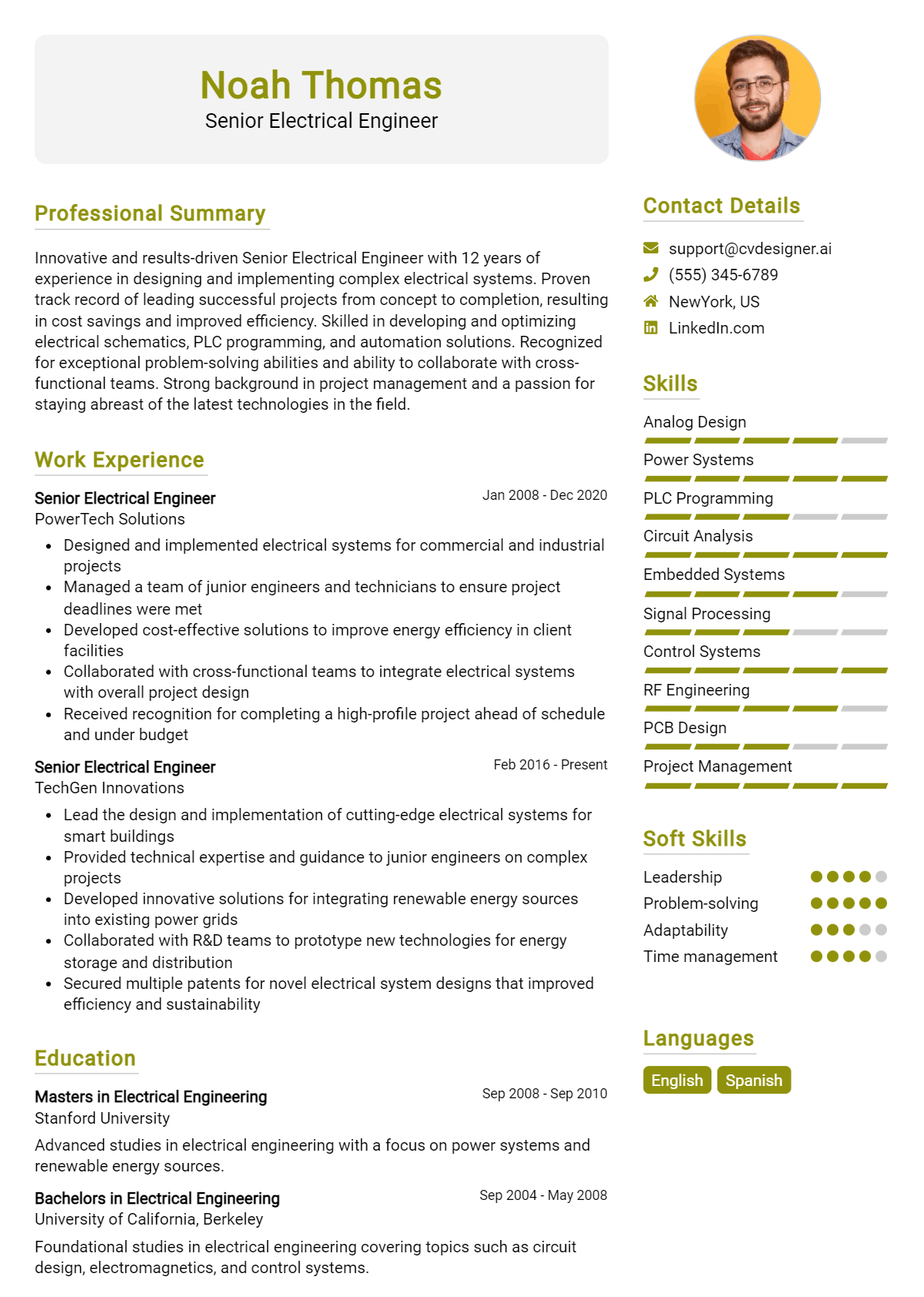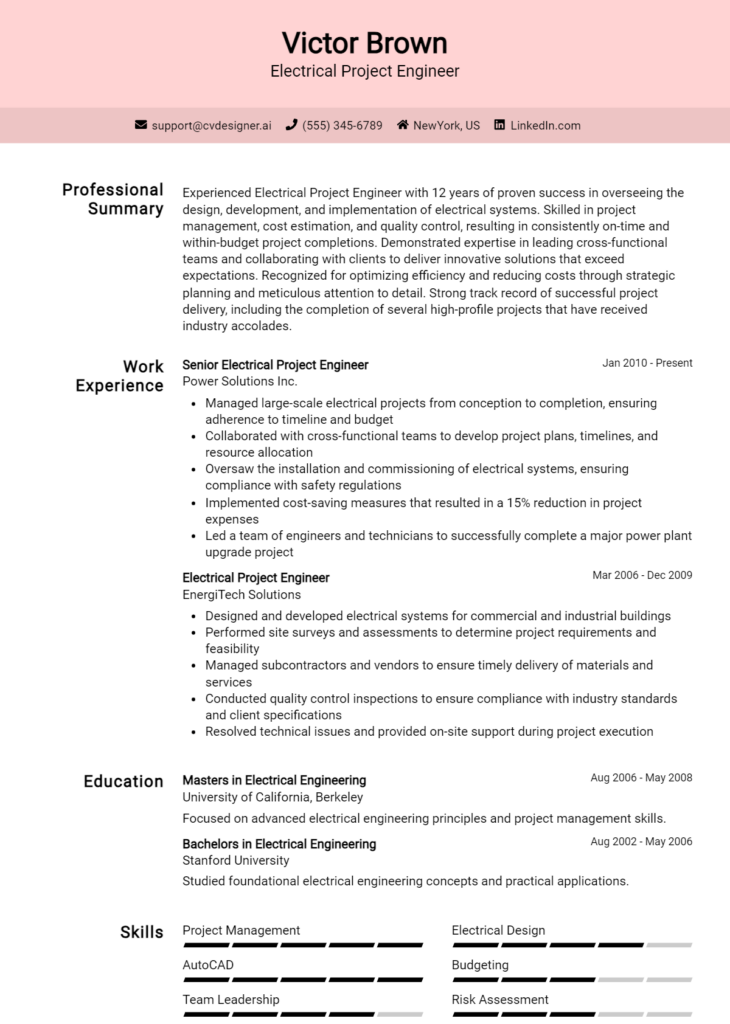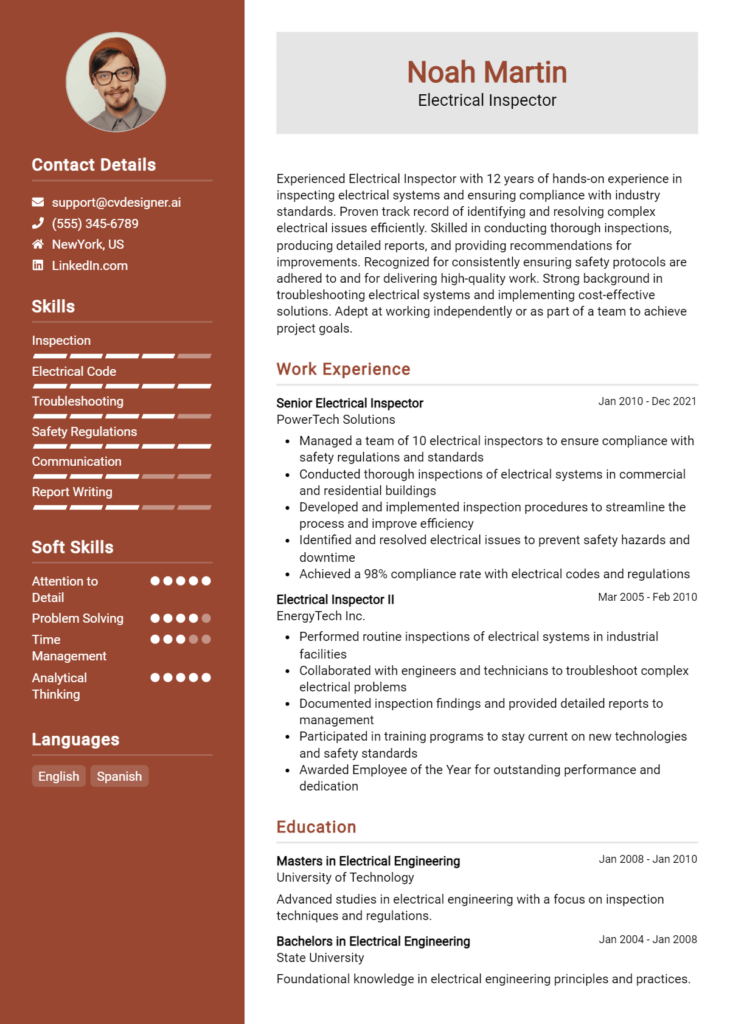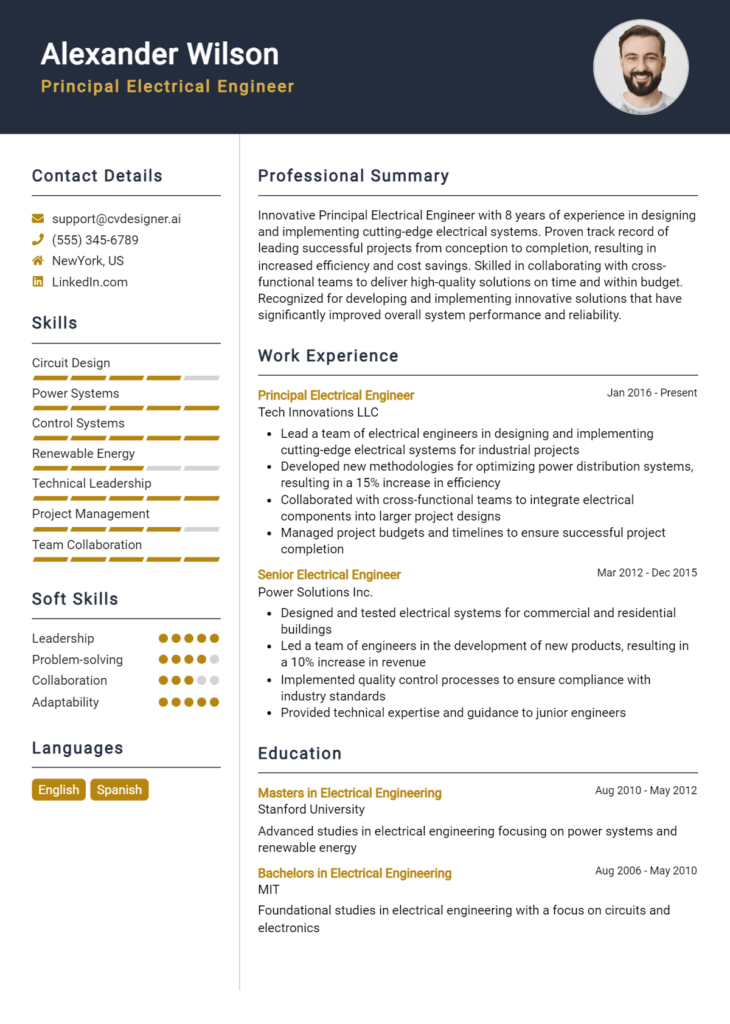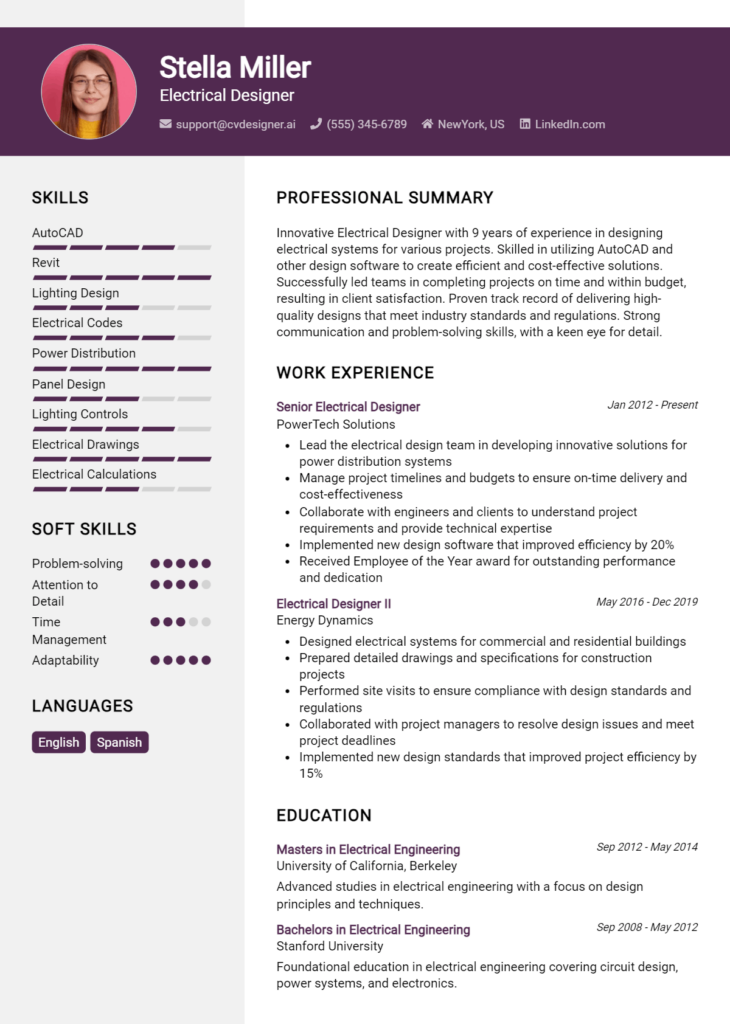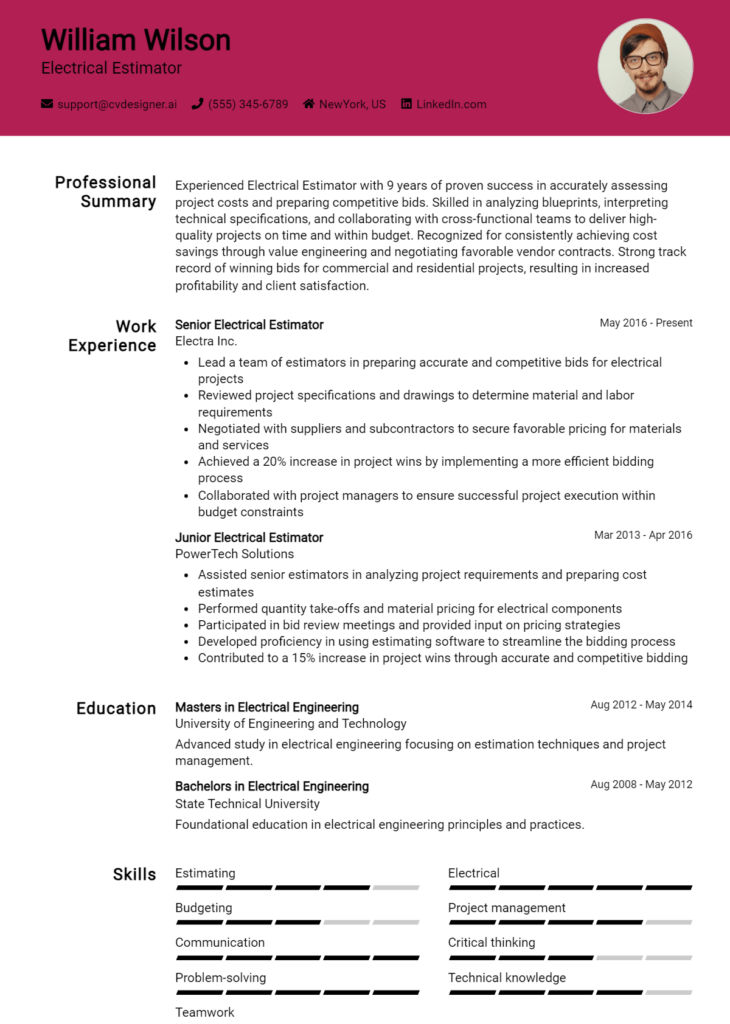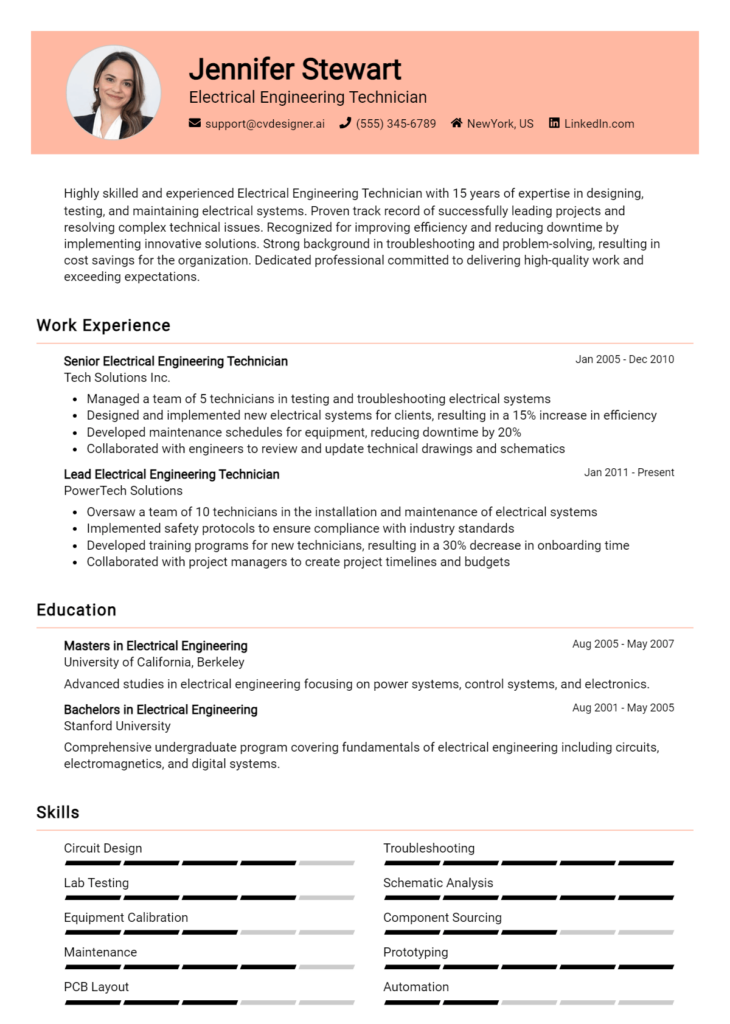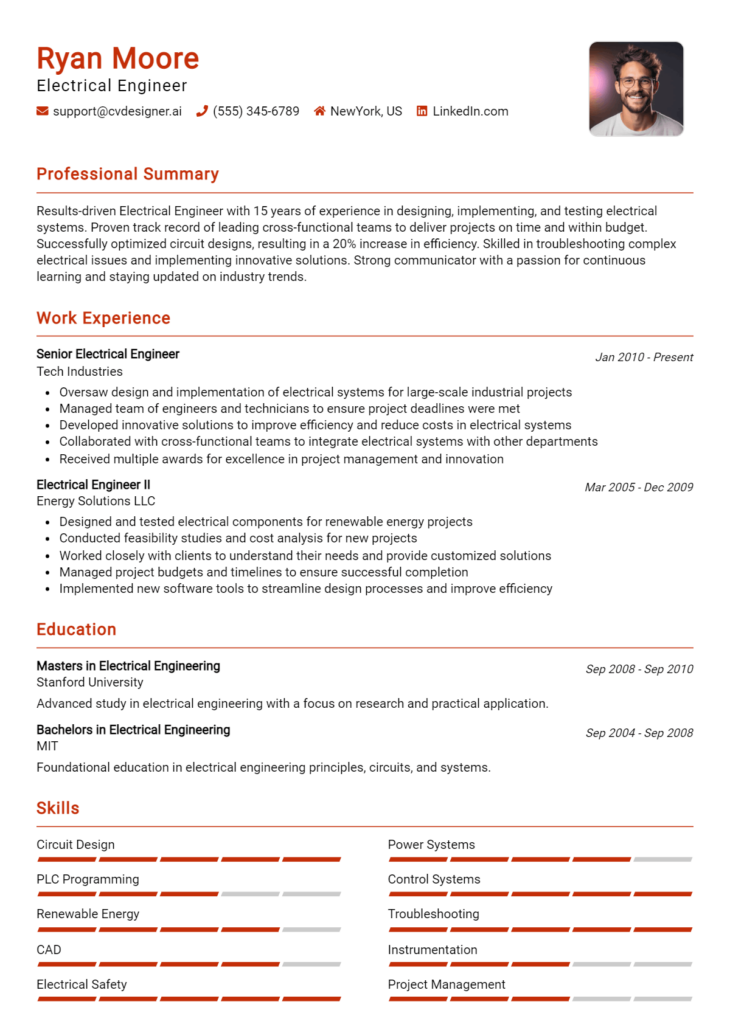Most Popular Senior Electrical Engineer Resume Examples
Explore additional Senior Electrical Engineer resume samples and guides and see what works for your level of experience or role.
As the backbone of innovative technology and infrastructure, a Senior Electrical Engineer plays a pivotal role in designing, developing, and maintaining electrical systems that power our modern world. With a mix of technical expertise, leadership abilities, and project management skills, this role is not only crucial for the successful execution of engineering projects but also for driving advancements in various industries. A well-crafted resume is your ticket to showcasing your unique skills and experiences, making it essential for standing out in a competitive job market. This guide will walk you through everything you need to know to create a compelling resume that highlights your qualifications and accomplishments effectively.
In this comprehensive resume writing guide, we will delve into the key responsibilities and skills that define the Senior Electrical Engineer role, ensuring you highlight the most relevant attributes in your resume. We will also discuss the best resume formats to use, common mistakes to avoid while crafting your document, and provide resume examples tailored for all experience levels. Additionally, you’ll find valuable tips on effective resume writing techniques and guidance on selecting the perfect resume templates that align with your professional image. By the end of this guide, you'll be equipped with the knowledge and resources to create an impactful resume that opens doors to exciting opportunities in your career.
Key Responsibilities and Skills for a Senior Electrical Engineer
A Senior Electrical Engineer plays a crucial role in the design, development, and implementation of electrical systems and components. This position typically involves overseeing projects from conception to completion, ensuring compliance with industry standards, and collaborating with multidisciplinary teams. Senior Electrical Engineers are responsible for leading design reviews, conducting testing and troubleshooting, and mentoring junior engineers. Their expertise is vital in optimizing electrical performance, enhancing safety, and ensuring project deadlines are met.
Key Responsibilities:
- Design and develop electrical systems and components for various applications.
- Conduct feasibility studies and risk assessments to evaluate project viability.
- Collaborate with cross-functional teams to integrate electrical systems with mechanical and software components.
- Lead design reviews and ensure compliance with regulatory standards.
- Manage project timelines, budgets, and resources effectively.
- Provide technical guidance and mentorship to junior engineers and interns.
- Troubleshoot and resolve complex electrical issues during the testing and implementation phases.
- Stay updated with industry trends and advancements in electrical engineering technology.
Essential Skills:
- Advanced knowledge of electrical engineering principles and practices.
- Proficiency in CAD software and simulation tools.
- Strong analytical and problem-solving abilities.
- Excellent project management and organizational skills.
- Effective communication and teamwork capabilities.
- Ability to mentor and guide junior staff.
- Familiarity with industry standards and regulations.
- Experience in testing and troubleshooting electrical systems.
Highlighting these skills effectively in the resume skills section is paramount. Tailoring these responsibilities and skills to align with the specific job description can significantly enhance the chances of securing an interview. When crafting a CV, consider how these skills demonstrate your experience and qualifications, showcasing your ability to contribute to future projects successfully. A well-structured CV that emphasizes these competencies will stand out to potential employers and reflect your readiness for the challenges of a Senior Electrical Engineer role.
Best Resume Format and Structure for a Senior Electrical Engineer
When crafting a resume for a Senior Electrical Engineer position, it's essential to choose a format that highlights your technical skills, experience, and achievements effectively. Here’s a detailed guide on the best resume format and structure:
Contact Information
- Name: Use a larger font for your name to make it stand out.
- Phone Number: Ensure it’s a direct line where you can be reached easily.
- Email Address: Use a professional email address.
- LinkedIn Profile: Include a link to your LinkedIn profile for additional information.
- Location: City and state are sufficient; exact address isn’t necessary.
Professional Summary
- Write a concise summary (2-3 sentences) that captures your years of experience, areas of expertise, and key achievements. Tailor this section to the job description to highlight your most relevant qualifications. Use strong action verbs and quantify your achievements where possible.
Work Experience
- Job Title, Company Name, Location (Month Year – Month Year)
- Use bullet points to list your responsibilities and achievements.
- Start each bullet with an action verb (e.g., Designed, Led, Developed).
- Include specific metrics or outcomes to demonstrate your impact (e.g., “Reduced system downtime by 25% through effective troubleshooting and maintenance”).
- List your work experience in reverse chronological order, focusing on the most recent positions first.
Education
- Degree, Major (e.g., B.S. in Electrical Engineering)
- University Name, Location (Month Year of Graduation)
- Include any relevant coursework, honors, or extracurricular activities that relate to electrical engineering.
Skills
- Create a section that lists both technical and soft skills relevant to the role.
- Technical skills may include software (e.g., MATLAB, AutoCAD), tools (e.g., oscilloscopes, multimeters), and methodologies (e.g., circuit design, systems integration).
- Soft skills might include leadership, teamwork, problem-solving, and communication.
Certifications
- List any relevant certifications, such as:
- Professional Engineer (PE) License
- Certified Energy Manager (CEM)
- Project Management Professional (PMP)
- Include the certifying body and the date of certification.
Additional Sections (if applicable)
- Projects: Highlight key projects you have worked on, including your role and the outcome.
- Professional Affiliations: Mention memberships in organizations like IEEE or other relevant groups.
- Publications or Patents: If applicable, list any published works or patents related to electrical engineering.
Formatting Tips
- Choose a clean, professional layout that uses ample white space.
- Use a font size between 10-12 points for text and 14-16 points for headers.
- Stick to a traditional font like Arial, Calibri, or Times New Roman for readability.
- Consider a one or two-page format depending on your experience; keep it concise and relevant.
The format of your resume should complement the corresponding cover letter. Ensure that both documents maintain a consistent look in terms of font, layout, and style. The cover letter should expand on the highlights from your resume, providing context and personal anecdotes that showcase your passion for the role and company. By aligning the content and format of both your resume and cover letter, you create a cohesive application that effectively communicates your qualifications and readiness for the Senior Electrical Engineer position.
Writing Tips and Best Practices for a Senior Electrical Engineer Resume
When crafting a resume as a Senior Electrical Engineer, it's essential to present your skills and experiences in a clear, professional manner that highlights your expertise and contributions to previous projects. Focus on showcasing your technical abilities and leadership qualities, and ensure your resume is tailored to the specific job description. Utilizing resume writing tips can enhance the overall presentation and effectiveness of your document. Additionally, consider how these practices can also be reflected in your cover letter for a cohesive application.
- Use action verbs to start bullet points, such as "designed," "developed," "implemented," and "led," to convey your contributions effectively.
- Quantify your achievements with specific metrics, such as "reduced project costs by 20%" or "successfully managed a team of 10 engineers," to provide context and impact.
- Incorporate industry-specific keywords relevant to electrical engineering, such as "circuit design," "power systems," and "automation," to improve your visibility in applicant tracking systems.
- Highlight relevant certifications, licenses, or advanced degrees that enhance your qualifications and set you apart from other candidates.
- Organize your experience in reverse chronological order, clearly delineating your roles and responsibilities in each position.
- Tailor your resume for each application by emphasizing the skills and experiences that align most closely with the job description.
- Keep your resume concise and focused, ideally one to two pages, ensuring that every entry adds value and relevance to your application.
- Review your resume for clarity, grammar, and formatting to maintain a professional appearance, and consider seeking feedback from peers or mentors in the field.
Common Mistakes to Avoid in a Senior Electrical Engineer Resume
Crafting a resume as a Senior Electrical Engineer can be a challenging task, and many candidates inadvertently make mistakes that can undermine their chances of landing an interview. It’s essential to present your qualifications, experience, and skills clearly and effectively. To enhance your resume and make a lasting impression, be mindful of the following common mistakes that should be avoided:
- Overloading your resume with excessive information, making it hard to read.
- Using generic job descriptions instead of specific achievements and contributions.
- Failing to tailor your resume for the specific job you are applying for.
- Ignoring the importance of formatting; a cluttered layout can detract from your qualifications.
- Omitting relevant technical skills and certifications that are crucial for the role.
- Including irrelevant work experience that doesn’t pertain to the position.
- Neglecting to quantify your accomplishments with metrics or specific examples.
- Using overly complex jargon that may confuse hiring managers.
- Not proofreading for spelling and grammatical errors, which can appear unprofessional.
- Failing to include a summary or objective statement that outlines your career goals and qualifications.
For further insights on refining your resume, consider reviewing the common mistakes to avoid in a resume. Additionally, don’t overlook the importance of your cover letter; many of the same pitfalls apply, so check out the common cover letter mistakes to ensure your entire application is polished and professional.
Sample Senior Electrical Engineer Resumes
As a Senior Electrical Engineer, your resume plays a crucial role in showcasing your expertise, experience, and contributions to potential employers. Below are three sample resumes tailored for different levels of experience: an experienced professional, an entry-level candidate, and a career changer. Each example highlights key skills, accomplishments, and relevant education to help you craft a compelling application. For more inspiration, consider exploring additional resume templates and corresponding cover letter examples to create a complete job application package.
Sample Resume 1: Experienced Professional
John Smith
123 Engineering Lane
Austin, TX 73301
(123) 456-7890
john.smith@email.com
Professional Summary
Accomplished Senior Electrical Engineer with over 10 years of experience in designing, developing, and managing complex electrical systems and projects. Expertise in power distribution, renewable energy systems, and project management. Proven track record of leading cross-functional teams to deliver innovative solutions and improve system efficiency.
Professional Experience
Senior Electrical Engineer
XYZ Engineering Solutions, Austin, TX
June 2016 – Present
- Led design and implementation of a 5 MW solar power project, increasing renewable energy contribution by 30% for the client.
- Managed a team of junior engineers and technicians, providing mentorship and fostering professional development.
- Developed and optimized electrical system specifications, resulting in a 15% reduction in project costs.
- Conducted system analysis and troubleshooting, significantly improving reliability and performance metrics.
Electrical Engineer
ABC Technologies, Austin, TX
July 2012 – May 2016
- Designed and tested electrical circuits and systems for industrial applications, enhancing operational efficiency.
- Collaborated with multi-disciplinary teams on various projects, ensuring compliance with safety standards and regulations.
- Assisted in the development of project proposals and budgets, securing funding for multiple high-profile projects.
Education
Bachelor of Science in Electrical Engineering
University of Texas, Austin, TX
Graduated: May 2012
Certifications
- Professional Engineer (PE) License, Texas
- Certified Energy Manager (CEM)
Sample Resume 2: Entry-Level Candidate
Emily Johnson
456 Engineering Ave
San Diego, CA 92101
(987) 654-3210
emily.johnson@email.com
Professional Summary
Detail-oriented Electrical Engineering graduate with hands-on experience through internships and academic projects. Proficient in circuit design, simulation software, and team collaboration. Eager to leverage technical skills and a passion for innovation in a challenging Senior Electrical Engineer role.
Education
Bachelor of Science in Electrical Engineering
University of California, San Diego, CA
Graduated: June 2023
Internship Experience
Electrical Engineering Intern
Tech Innovations, San Diego, CA
June 2022 – August 2022
- Assisted in the design and testing of electrical systems for consumer electronics, contributing to a 20% reduction in product development time.
- Collaborated with design teams to develop schematics and prototypes, gaining proficiency in CAD software.
Academic Projects
- Developed a solar-powered charging station as a capstone project, focusing on sustainable energy solutions.
- Designed a microcontroller-based home automation system, integrating IoT technologies for improved user experience.
Skills
- Circuit Design and Analysis
- Proficient in MATLAB, AutoCAD, and PSpice
- Strong problem-solving and analytical capabilities
- Excellent communication and teamwork skills
Sample Resume 3: Career Changer
Michael Brown
789 New Path Road
Seattle, WA 98101
(321) 654-9870
michael.brown@email.com
Professional Summary
Versatile professional transitioning into Electrical Engineering with over 5 years of experience in project management and technical support in the telecommunications industry. Strong foundation in electronic systems and a passion for renewable energy solutions. Seeking to leverage diverse skills and knowledge in a Senior Electrical Engineer position.
Professional Experience
Project Manager
Telecom Solutions, Seattle, WA
March 2018 – Present
- Managed multiple projects focusing on telecommunications infrastructure, ensuring on-time delivery and adherence to budget constraints.
- Collaborated with engineers to troubleshoot and optimize network performance, enhancing service reliability.
- Conducted training sessions for team members on new technologies and project management methodologies.
Technical Support Specialist
Digital Networks, Seattle, WA
January 2016 – February 2018
- Provided technical support for electronic devices, resolving issues and improving customer satisfaction ratings.
- Developed training materials and user manuals for new products, streamlining onboarding processes.
Education
Bachelor of Science in Electrical Engineering
Washington State University, Pullman, WA
Expected Graduation: May 2024 (in progress, while working)
Skills
- Project Management
- Technical Troubleshooting
- Knowledge of Circuit Design and Analysis
- Strong Leadership and Communication Skills
These samples illustrate various approaches to presenting your qualifications as a Senior Electrical Engineer. Tailor your resume to reflect your unique experiences and achievements, and don't forget to explore additional resources for inspiration!
Checklist for a Senior Electrical Engineer Resume
- Proofread for Spelling and Grammar: Carefully check for any spelling errors, grammatical mistakes, or typos. Consider reading your resume aloud to catch any awkward phrasing.
- Check Formatting Consistency: Ensure that your fonts, bullet points, and spacing are uniform throughout the document. A clean, professional layout enhances readability.
- Tailor Your Resume to the Job Description: Customize your resume to align with the specific requirements and keywords mentioned in the job posting for the Senior Electrical Engineer position.
- Highlight Relevant Skills and Projects: Ensure that the skills and projects highlighted on your resume directly relate to the role you are applying for. Use quantifiable achievements to demonstrate your impact.
- Use Action Verbs: Start each bullet point with strong action verbs to convey your responsibilities and achievements clearly and dynamically.
- Limit Length to One or Two Pages: Keep your resume concise. Aim for one page if you have less than 10 years of experience, and two pages if you have more extensive experience.
- Include Contact Information: Make sure your contact details are up to date and prominently placed at the top of your resume, including your LinkedIn profile if applicable.
- Provide Clear Job Titles and Dates: Clearly outline your employment history with job titles, company names, locations, and dates of employment to provide a coherent career timeline.
- Consider Visual Appeal: A well-organized and visually appealing resume can make a significant difference. Using an AI resume builder can help ensure all elements are well-structured.
- Utilize a Similar Checklist for Other Documents: Remember, a similar checklist can be applied when creating your CV or cover letter to ensure consistency and professionalism across all application materials.
Key Takeaways for a Senior Electrical Engineer Resume Guide
In conclusion, as you embark on crafting your Senior Electrical Engineer resume, remember that the key to standing out lies in showcasing your technical expertise, project management skills, and relevant experience effectively. Utilize the examples and tips provided to highlight your achievements and qualifications that align with the job requirements. To take the next step towards creating a compelling resume, consider downloading a template from resume templates, or explore our collection of cover letter templates to complement your application. For a more personalized approach, you can also use our best resume maker to tailor your resume to your unique skills and experiences. By following similar guidelines, you will also enhance your chances of producing an impressive CV and an engaging cover letter. Start your journey towards landing that Senior Electrical Engineer position today!
